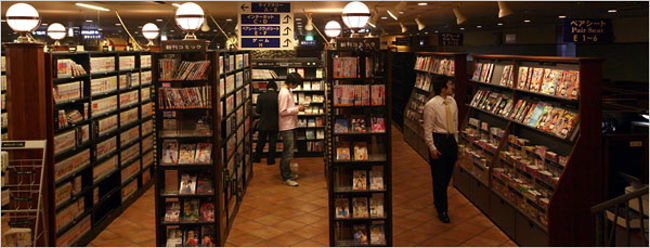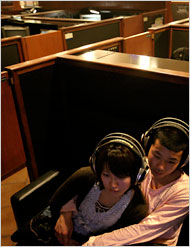May 16, 2006
Cyber-Binge in Japan: Media Immersion Pods

Cyberpunked life continues down the path of the bizarre. The New York Times recently had a very well done article on Japan’s Media Immersion Pods. In Japan, people escape the pressures of society by checking into a Cyber Café for hours on end - sometimes even overnight. Tokyo is now littered with Cyber Cafés that have vast stacks housing all varieties of media (see above) including movies, mangas, music, games, porn, and anything else that captivates the infomania craze. People take these materials back to media immersion pods, which are essentially cube farms, completely decked out with computers, headphones lounge chairs and reading space.
In the world’s most media-saturated city, people take a break by checking themselves into media immersion pods: warrens cluttered with computers, TV’s, video games and every other entertainment of the electronic age.
The Bagus Gran Cyber Cafés are Tokyo’s grand temples of infomania. Situated well above retail level, on the odd floor number where in Manhattan you might find tarot readers or nail salons, these establishments contain row after row of anonymous cubicles. At first glance the spread looks officelike, but be warned: these places are drug dens for Internet addicts.

Apparently, the Cyber Cafés offer an oasis away from modern Japanese society where someone can shed their social encasement in favor of anonymity. In the “real” world, Japanese society is very structured to the point that an individual’s interactions and modus operandi are significantly influenced by their job, family, social status, etc. Cyber Café users are able to pursue their fantasies without reality intruding on them. There are even pods for couples, where couples watch porn and make out, without regard for others just a cube over.
Hidenori Kimura, a sociologist who writes about intercultural encounters, said he believes the Gran Cyber Cafés fulfill a deep and persistent cultural longing. The Japanese system of competition for education, career and social esteem, Dr. Kimura explained, forces young people to obsess over self-presentation, which costs them both fantasy and anonymity, the privileges of childhood. What Japanese young people want, in his view, are opportunities to be free of their social status.
“Traditionally,” he explained, “tea ceremonies and festivals have been fulfilling this role of depriving people of their social status and thus help them become ‘nobody.’ Tea ceremonies deprived the feudal elites of their status and made them just a person enjoying tea ceremony and tea, while festivals among farmers offered an enclave of anarchy during the festivals where they were free of norms and rules of feudal eras.”
The Gran Cyber Cafés now serve this purpose, he said. “Nobody cares what you do, which enables you to be absorbed in whatever fantasy you want to indulge in through Net surfing, Web games or manga. Yet you can satisfy your timid desire to belong.” Staying in the Gran Cyber Cafés, he concluded, is now part of jibun-sagashi, or the search for the true self.
Said another way, the pressures placed on us by the complexification of modern society along with the changes brought about the infomania craze has created significant numbers of infomania addicts. Similar to the opium dens in years past, the Cyber Cafés offer people in society an escape - only this time, instead of checking out, they are checking in. The Cyber Café users of Japan completely immerse themselves in infomedia world as a way of checking out from society. One wonders if this response is unique to Japanese culture, or whether we’ll see the same type of place cropping up in the rest of the industrialized world.
Comments
May 17, 2006
Anonymous said:
I’m kind of surprised we haven’t seen something similar to this in America yet.
Nesuphyn said:
I think the major reason that this hasn’t become popular in America is because in America there is more of a sense of ownership of personal space. Professor Masataka has noted that the newer generation of Japanese youth have a very mobile lifestyle of grazing from one location to another in closely knit groups. Where in America, we could just hang out at each other’s homes. Without this sense of a private place to be, there are many business that cater to this niche in Japan, especially in the bigger cities.
SFAM said:
I kind of think to the bath houses in Japan. There, people can be nude and not “notice” each other (at least visibly). This would never work in the US. Maybe something similar is going on there where people again overtly “don’t notice” one another.
But it would be great if one of my Japanese readers (I know you’re there! I’ve seen the usage statistics!) would comment on this with an insiders perspective. It does sound interesting though - I wish we had these.
DeadImpulse said:
“I kind of think to the bath houses in Japan. There, people can be nude and not “notice” each other (at least visibly). This would never work in the US. Maybe something similar is going on there where people again overtly “don’t notice” one another.”
Have you never been in a locker room shower at school or at the gym? In that environment I certainly try to not notice anyone.
Sitting in my room and looking around I see a TV, stacks of DVDs, piles of books and manga, and of course my computer. So I’m already immersed in media but I would still visit a place like that just to feel like I was out of the house and doing something.
Nesuphyn said:
Not to name drop or anything, but I’m one your Japanese readers. Just as an addition, Professor Masataka is a Primatologist from Kyoto University. I think “DeadImpulse” proves my point though, Americans have the space and motivation to stockpile DVDs and books in their own homes. In Japan, especially in the cities when one lives in the same cramped apartment long into their 20s and 30s, there is just no space for such a practice. People buy manga and DVDs then sell the ones they don’t treasure enough to take up space at home. Which is why used goods stores such as the infamous “Book-off” can be so prevalent in Japan.
SFAM said:
Hi Nesuphyn, awesome! Welcome to you in Japan
I hope to see you posting more around here. So in regards to the question of whether other countries might do this, would I be correct in saying that if this is done in the US, it might only be done in the larger cities, where space is at a premium (although maybe not as much as Japan)?
Also, what about the business that “delivery health girls” use this as their base of operations? On the face of it, it sounds like anonymity is really at a premium in these places. Is this truly different from the rest of society?
May 18, 2006
Nesuphyn said:
(No prob, I found this site less than a month ago, it’s really great.)
I think that if it were done in the US, it wouldn’t be as popular. Even in the larger cities, people would rather have the DVDs, comics, and internet in their own homes. I don’t think Americans would feel as comfortable with sitting around watching DVDs or surf the internet in a “public” area, especially if they had to pay by the hour.
As for freelance prostitution in these places, I’d hardly think this was something exclusive to “cyber-cafes” (or even Japan for that matter). A place like this would allow for such business to take place because of Japanese society as a whole. There is a common belief that it is a great social faux pas to intervene in other people’s problems. I believe that it’s from the fact that people live so close to each other. The Japanese tend to be much more tolerant the privacy of strangers. (Although in small town where everyone knows each other, it’s a whole different world.) It’s like the whole concept of couples making out in the movie theater taken to a few higher levels. Even if we noticed such a thing, unless if they were actively taking away our own enjoyment of the movie, we’d just let it be rather than cause an even bigger ruckus to do something about it. There are many different niches in which prostitutes have found to offer their services, this would be but one of them.
In the end “cyber-cafes” are really no different than other Japanese businesses such as “hostess bars”, “maid cafes”, “manga cafes”, “karaoke rooms” and “love hotels”. They are the product of the modern Japanese society.
ETM said:
It’s… it’s the Pod People! [/lame joke]
A really interesting concept.
SFAM said:
Nesuphyn, “maid cafes”??? What are these?
In any event, I truly appreciate the insight you bring. I still find it incredible that people spend the night in these places. If, by any chance, you frequent these places, I’d LOVE to have some better pictures of them to post, specifically, some better shots of the pod places, preferably with lots of people in them.
Nesuphyn said:
If you want to get into “maid cafes”, perhaps this would better be continued in your forum. Look for the thread “Cyberpunk in Japan.”
April 6, 2007
Media Immersion Pod Spotlight: B@gus Cyber Cafe | Cyberpunk Review said (pingback):
[…] CPR previously did a write-up on Japanese Media Immersion Pods. Here’s an in-depth look at one of them: B@gus Cyber Cafe 12F Roi Building, Roppongi […]